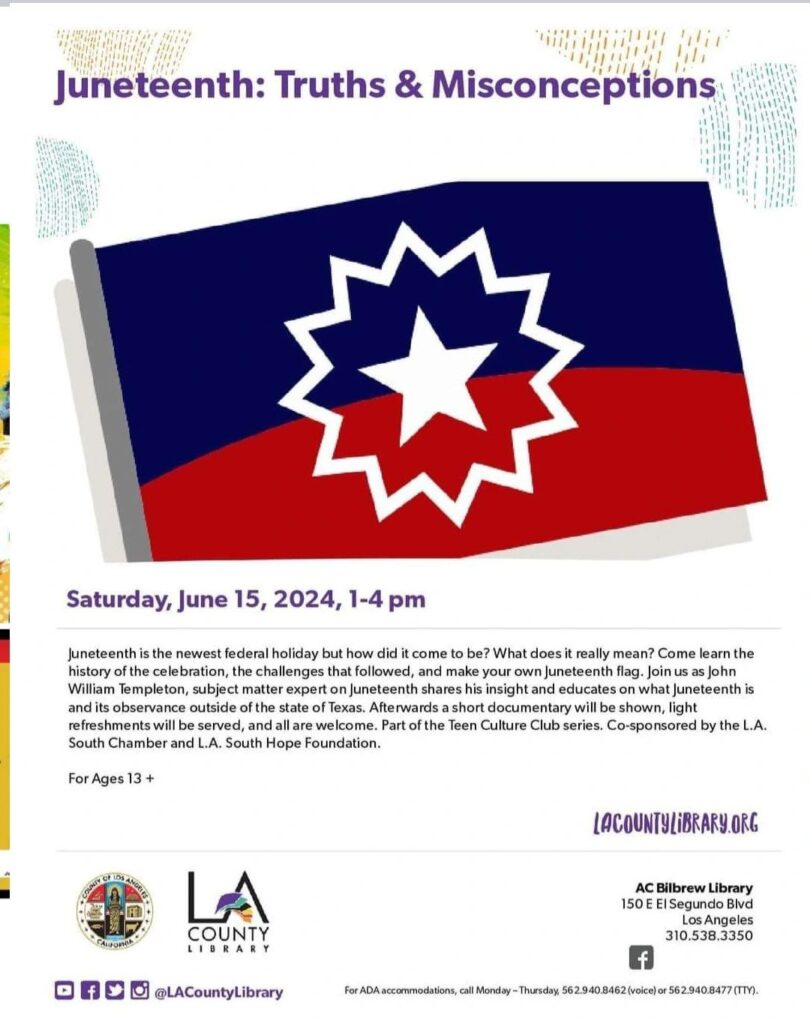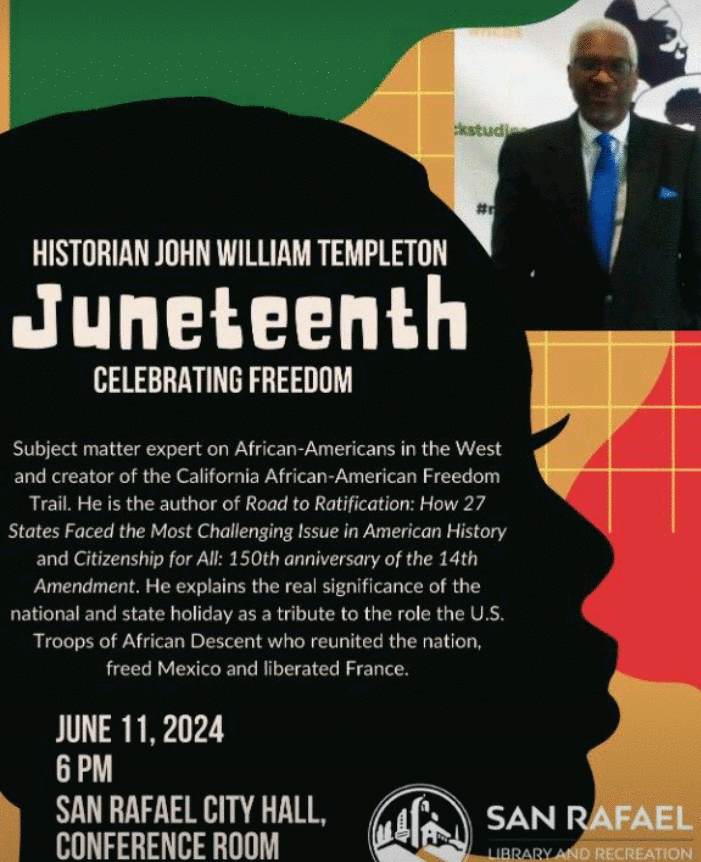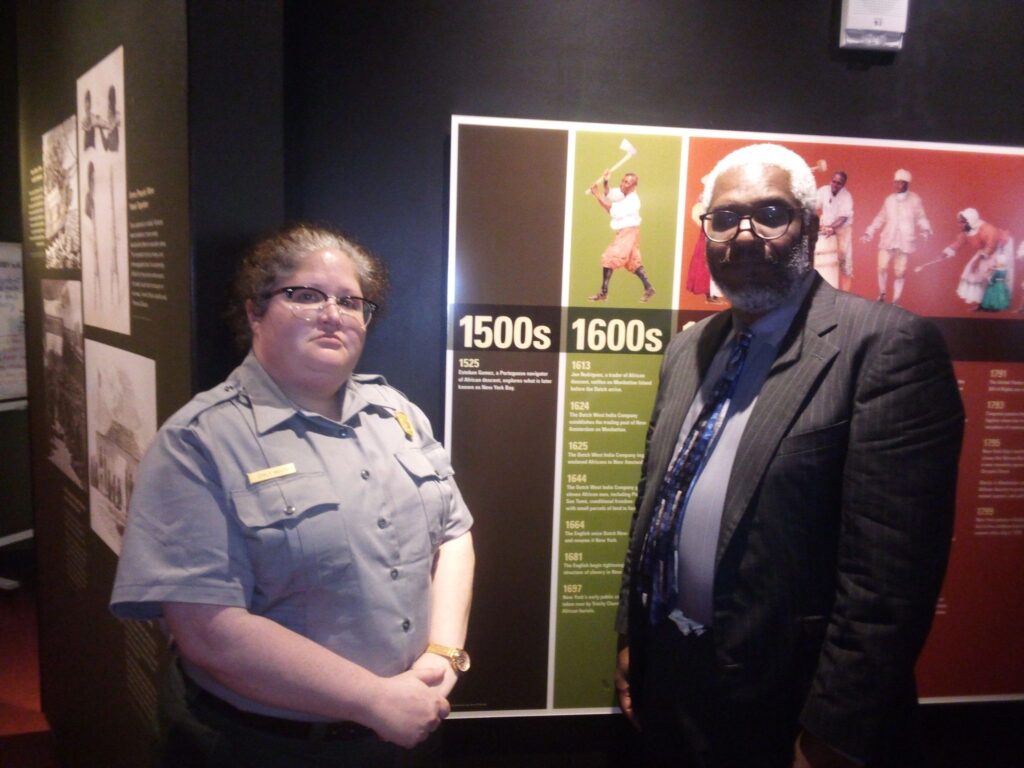
SAN FRANCISCO—That’s the question John William Templeton asked when the late Mary Helen Rogers asked him to research the history of June 19 in the mid 1990s. She had taken over the San Francisco Juneteenth observance from founder Wesley Johnson in the early 1970s, now in its 75th year as the first such observance outside of Texas.
How U.S. Troops of African Descent Defeated the Confederacy is his answer in multiple appearances this week.
Templeton, the first to write about Black History Month in 1976 and the first to view the Emancipation Proclamation at the National Archives on its 150th anniversary, is known as The Black Encyclopedia for his 52 years as a scientist and journalist.
This week also marks the tenth anniversary of the 6,000 site California African-American Freedom Trail, based on Our Roots Run Deep: the Black Experience in California, Vols. 1-4 and 30 years since Rogers asked him to be the official historian of San Francisco Juneteenth.
| From Bernal to Pacific Heights, John Templeton tracks black livesWhen asked if he’s comfortable being known as the official historian of Black San Francisco, John Templeton laughed, “I couldn’t…www.sfexaminer.com |
Now that Juneteenth is a national holiday, every one needs to know the answer.
June 19 is appropriately recognized as the end of the Civil War, says Templeton, not the end of slavery. “The difference between June 19 being the end of the war and Appomattox Court House goes to the heart of our current national debates. The 14 regiments of U.S. Troops of African Descent in Texas in 1865 were sent there because Texas had not surrended and threatened to join French forces occupying Mexico. Gen. U.S. Grant sent the 25th Corps that occupied Richmond by ship from Virginia in May 1865 to uphold the Monroe Doctrine and force the Confederate surrender. They joined five regiments from the Corps d’Afrique who had occupied the mouth of the Rio Grande since November 1863.”
The stereotypical myth that Texas Blacks did not know about the Emancipation Proclamation is not supported by primary sources, and is one of the reasons that conservative Texans backed the national bill just weeks before banning the study of slavery in its public schools.
“Galveston was actually the first Confederate capital to fall, captured by the Union Navy just a month after President Lincoln issued the preliminary Emancipation Proclamation in October 1862,” notes Templeton, author of African-Americans in the West in the Oxford Encyclopedia of African-American History. Freedom With the Sward, by the U.S. Army Center for Military History is the reference source for the importance of Texas in the Civil War.

“The spark for the U.S. Civil War was the Mexican Civil War of 1857-59,” adds Templeton. “As a consequence, French forces invaded Mexico. The South thought it could avoid tariffs that forced cotton to be shipped to Northern factories and deal directly with Europe, so its planters chose the raid on Harpers Ferry and the election of Abraham Lincoln as the pretext.”
Historians miss the agency of four million Africans as the deciding factor in the war. A convention in Chatham, ON had laid out a strategy for rebellion to free more than 3.6 million in slavery. John Brown was elected as minister of defense of the revolutionary government. Funding for his raid on Harpers Ferry came from millionaire Mary Ellen Pleasant in San Francisco. Dr. W.E.B. DuBois in his book aptly calls the war “The Slave Rebellion.”
“Secession would backfire because former Seminoles who had migrated to Mexico defeated the French at Puebla, delaying their advance after the Union capture of the Mississippi River, and 1 million Blacks would flee and join the U.S. military after California abolitionists took control of the state’s government in 1862 following 40 days and nights of rain,” adds Templeton, who’s filed a National Register nomination for five Black organizations in San Francisco founded in 1852 to support the Underground Railroad. (see Jan. 22, 2023 sermon at Third Baptist Church)
“By the war’s end, a third of the Union Army were U.S. Troops of African Descent and their victories in 1865 after the passage of the 13th Amendment in January included Wilmington, Charleston, Mobile and then Galveston,” adds the Civil War expert. “Gen. Grant especially gave the 25th Corps which captured Petersburg, then Richmond and cut off Gen. Robert E. Lee at Appomattox Court House the honor of ending the war by sending them to Galveston.”
By the way, the myth is also not correct about ending slavery. It took an additional year for the U.S. Army to go plantation by plantation and forcibly free Texas Blacks from slavery. Texas did not have the devastation of the rest of the South once Grant was transferred from the Western theater to Northern Virginia so it is incorrect to assume that those held forcibly had the option of leaving without military intervention.
“Mrs. Rogers said of Templeton, ‘you tell the history the way we remember it.” That includes his 2022 documentary BlackWomanComing: They Scared of Mary Helen Rogers, about a 9th grade educated woman who was responsible for the Uniform Relocation and Assistance Act in 1971 after jousting with Gov. Ronald Reagan and President Richard Nixon.
“Like the abolitionists of the 19th century, her motto was Resistance, Resistance, Resistance,” Templeton recalls. His instructional network, ReUNION: Education-Arts-Heritage has published three textbooks with accompanying video series:
- Road to Ratification: How 27 States Faced the Most Pressing Issue in American History
- Citizenship for All: 150th anniversary of the 14th Amendment
- We Fought, We Vote: 150th anniversary of the 15th Amendment
All are available at californiablackhistory.com.
“The meaning of Juneteenth for all Americans and the larger world is that we would not have had a country had it not been for the 209,145 U.S. Troops of African Descent who defeated the Confederacy. You don’t have to believe me—that’s the testimony of Robert E. Lee and Jefferson Davis to the Joint Reconstruction Committee,” notes Templeton.
More broadly, their intervention in Texas led to the defeat of the French invasion and the overthrow of the French monarchy. The return to democracy in France led to the spread of democracy across Europe to replace royal governments.
“June 19 is definitely worthy of being celebrated by the whole world. It’s our job to make sure they know the primary source record and can apply it to the current attempts by contemporary Confederates to gaslight history,” concludes Templeton.
You may also like
-
70 Cities Leaders Provide Diaspora Insights
-
Flint’s Weaver says water illustrates why the 14th Amendment is important for African-Americans
-
Hurricane shows health care vulnerability
-
Holness: “We are bearing the brunt of climate change”–Earliest Category 5 storm in history
-
How strategy, courage and unity brought the Civil Rights Act of 1964 into law 60 years ago

